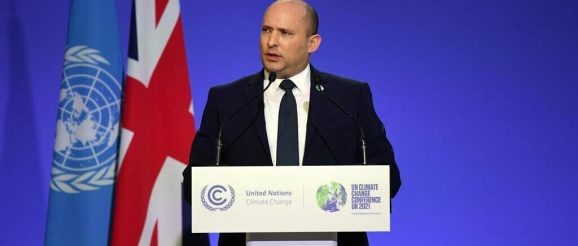PM in Glasgow: ‘Climate innovation nation’ ready to ‘pave way’ on solutions | The Times of Israel

GLASGOW, Scotland — Israel will make its greatest contribution to the global war on climate change by leveraging the technological creativity and inventiveness of its people to find solutions “that have not yet even been imagined,” Prime Minister Naftali Bennett told world leaders at the UN’s COP26 climate conference in Glasgow on Monday.
Behavioral change to cut emissions would only take the world so far, he said.
“If we’re going to move the needle, we need to contribute Israel’s most valuable source of energy — the energy and brainpower of our people,” according to Bennett. “This is what fuels our innovation and ingenuity. This is where Israel can make a real difference.”
“We’re less than a third of the size of Scotland. Our carbon footprint may be small, but our impact on climate change can be mighty,” he went on, announcing that he had set up a task force called the Green Sandbox to provide funds for climate tech initiatives and cut red tape.
On Sunday, Bennett had told reporters that the government would establish a special fund to encourage local tech entrepreneurs to invest in green technology.
“Israel may be 60 percent desert, but we managed to make it bloom,” Bennett told the leaders in Glasgow Monday. “We may be in one of the driest places on earth, but we managed to become the world’s number one country in water innovation.”
He added, “As the country with the most startups per capita in the world, we must channel our efforts to saving the world… Israel can become the ‘climate innovation nation’ and we’re ready to pave the way.”
Bennett appealed to entrepreneurs and innovators in Israel and around the world to be “game changers” and to “help save our planet.”
“Instead of building yet another hyped-up app, why don’t you launch startups that will help solve this global threat?” he asked.
Bennett said that on bringing down emissions, Israel was “at the beginning of a revolution.”
He cited the government’s recent decision to set a net-zero emissions target by 2050 and its 100-step plan to get there as evidence that Israel was “currently doing more to promote clean energy and reduce greenhouse gases than at any other time in our country’s history.”
Coal would be phased out by 2025, he said, citing a target set by the previous government led by Benjamin Netanyahu.
“As we gather here today in Glasgow, we know that history will judge our generation’s response to this [climate] threat — not by how ambitious we are, but by the actions we take,” Bennett said.
“As we work to keep people safe today, we will also be working for the resilience of tomorrow, where our children will breathe cleaner air, drink cleaner water and live in a world that treats the planet better than we did.”
Bennett is leading a 120-strong Israeli delegation to the COP26 Glasgow talks.
On Friday, Bennett and Energy Minister Karine Elharrar announced that Israel will join the growing number of countries pledging to be carbon neutral by 2050.
The move upends the policy of the previous government, announced in April, which was to cut carbon emissions by 80% across the board by 2050 and emissions from the electricity sector in particular by up to 85%.
As well as addressing the climate crisis, Bennett met with a series of world leaders at the Glasgow conference, including France’s Emanuel Macron, Canadian Prime Minister Justin Trudeau, and Australia’s Scott Morrison. The meetings were Bennett’s first with those leaders since he took office in June.
The Israeli delegation will depart the conference on Tuesday night.
